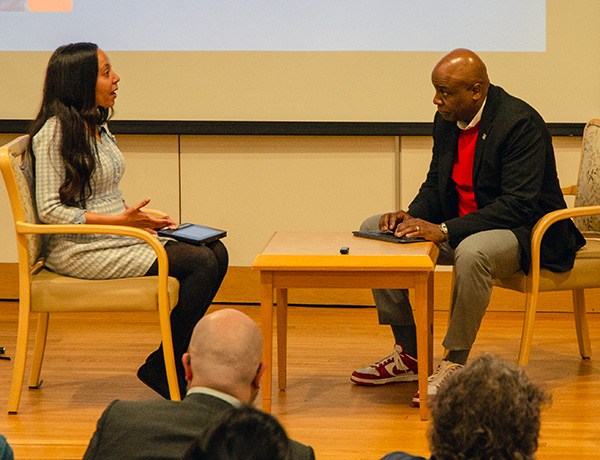
When she notified the cafeteria manager, she was told, “We're very busy. We don't have time to do special things for students with special needs.”
“Just to be clear,” Girma told a packed audience at UHart’s Wilde Auditorium, “eating is not a special need.”
Girma, who is deafblind, was the speaker at the spring 2025 Rogow Distinguished Visiting Lecturer Series, which brings celebrated authors, journalists, historians, academics, and artists to campus and the Greater Hartford area. Girma spoke on “Disability and Innovation” – a topic she brings to schools and organizations around the country as a human rights lawyer and disability advocate.
“Deafblindness is not my biggest barrier,” Girma said. “My biggest barrier is ableism.”
To overcome that barrier, Girma became an activist – and eventually the first deafblind woman to graduate from Harvard Law School. She encouraged the audience in Wilde, many of whom were also deafblind, to think differently about disability – like the owners of a school where she learned to surf.
“I reached out to surf schools asking, ‘Can I take classes?’ And they said, ‘We don't mean to be discouraging, but we've never heard of a deafblind surfer.' Then I found one school that said, ‘Let’s try. Let's figure it out.’"
In the process, Girma says, the instructors deepened their understanding of their field. "They were used to teaching by sight, and as they were exploring it, they were realizing new things about surfing and the ocean.”
Haben Girma, Human Rights Attorney and Disability Advocate“There are many, many stories woven into our world of disability sparking innovation. The difference is that now we're more aware of ableism and we can talk about disability without the shame that often made these stories hidden and invisible in the past.”
During the Q&A session, Girma read questions from audience members, sometimes relayed through an ASL interpreter, that were typed on a keyboard connected to her braille display. Tools like these, Girma says, make the difference when navigating a largely ableist world.
“There are many, many stories woven into our world of disability sparking innovation,” she says. “The difference is that now we're more aware of ableism and we can talk about disability without the shame that often made these stories hidden and invisible in the past.”
It’s a lesson Girma learned in her college cafeteria, where she invoked the Americans With Disabilities Act and got the management to email her the menus. “The next year, there was a new blind student at the college, and he had immediate access to the menus,” she said. “That taught me that when I advocate, even for seemingly small things, it makes a difference in our community.”